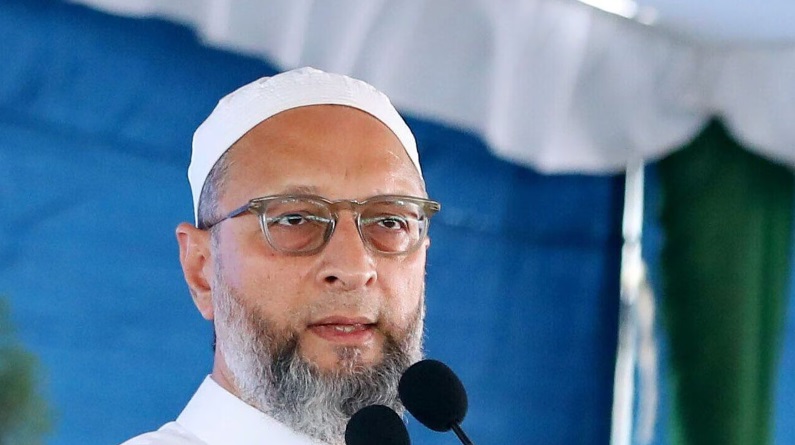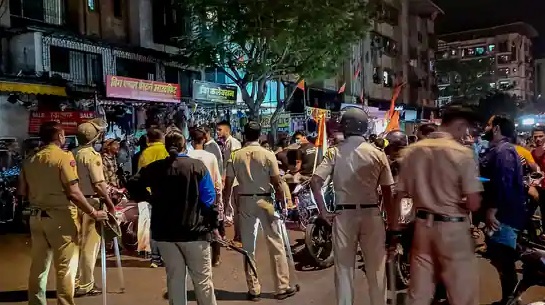
The Asaduddin Owaisi factor in Lok Sabha elections
Asaduddin Owaisi is setting his sights higher with the 2024 Lok Sabha elections. Will he be able to make a mark in the Hindi heartland?
In the heat and dust of electioneering in the politically crucial Hindi heartland, the big question is which way will the Muslim vote swing?
Another critical, and connected, question: Will Asaduddin Owaisi emerge as the voice of this once-powerful group, which at one time encapsulated minorities, backward castes, and Dalits?
The questions have national significance considering that Uttar Pradesh and Bihar together command 120 parliamentary seats. The four-time MP from Hyderabad is challenging the national parties’ track-record on minorities, backward castes and Dalits.
During an interaction, Owaisi, president of All India Majlis-e-Ittehadul Muslimeen (AIMIM), said: “In UP and Bihar, the so-called secular parties are becoming like the Bharatiya Janata Party (BJP). That is why there is no talk of political representation for Muslims or raising the issue of minority rights.”
Speaking in his Urdu, Owaisi, dressed in a trademark sherwani, doesn’t shy away when confronted with the charges of being the ‘B’ team of the BJP, keen on splitting the Muslim vote.
“INDIA leaders, are constantly abusing us, calling us the ‘B’ or ‘C’ team, while they themselves are allying with the Shiv Sena. Many of their leaders and party candidates have been with the BJP at some time or the other,” he counters.
“They are insulting us, and we have our self-respect and dignity to protect – izzat-e-nafz bhi to koi cheez hoti hai,” he adds.
In Bihar, Uttar Pradesh, Maharashtra, Tamil Nadu, and home turf Telangana, AIMIM under Owaisi’s leadership will be on a political overdrive in this election.
While the AIMIM alliance in UP (with Apna Dal- Kamerawadi) and Tamil Nadu (with AIADMK) has been announced, more details are expected during a proposed mega rally on April 25th. The party has declared its support for Prakash Ambedkar in Akola and Anand Ambedkar in Amaravati in Maharashtra.
In Telangana during the 2019 general elections for 17 seats, AIMIM had won one seat while the ruling Bharat Rashtra Samithi (then TRS) won nine, BJP four, and Congress won three seats. The AIMIM has so far announced the candidature of its president Asaduddin Owaisi to retain the Hyderabad seat for the 2024 elections.
AIMIM’s presence in Uttar Pradesh will be in alliance with Apna Dal (Kamerawadi) as PDM Nyaya Morcha – Picchda, Dalit and Muslims. Pallavi Patel is, as Owaisi said, the face of PDM’s campaign in UP where seven Lok Sabha seats are at stake.

Since 2017, AIMIM has tested the political waters in Uttar Pradesh: during the assembly elections that year, AIMIM formed an alliance with Jan Adhikar Party and Bharat Mukti Morcha. Though it contested 38 seats, it could not open its account. The same story was repeated in the 2022 elections: 97 seats were contested without a win to show. Now in the general elections this year, AIMIM as PDM Nyaya Morcha is contesting seven seats, with more to be announced.
The results in Bihar were a shot in the arm for this fledgling party wanting a foot in the door in north India. It was with the by-polls in Kishanganj in 2019 that AIMIM stole the show, making headlines as Qamrul Hoda won the seat defeating BJP’s Sweety Singh. In the 2020 assembly elections, AIMIM secured five seats.
Owaisi has now set his sights higher. AIMIM is poised to contest at least 11 parliamentary seats in Bihar: fielding candidates in Darbhanga, Bhagalpur, Karakat, Buxar, Gaya, Muzaffarpur, Ujiyarpur besides Seemanchal’s four seats – Purnea, Katihar, Araria and Kishanganj.
“Bihar needs Muslim leadership, the whole project of social justice requires astute leadership,” Owaisi said, referring to the Janata Dal-United under Nitish Kumar, the Rashtriya Janata Dal and Yadav clans and the Lok Janshakti Party under the Paswan family.
Owaisi says: “Every caste has its leadership, so why has Muslim leadership not been nurtured?” It is a question that is growing in resonance as the Mandalite generation of leaders morphs into family dynasties, creating an aristocracy of politicians whose identity is now based on untold wealth, celebrity status and access to the powers that be.
During the just-concluded Ambedkar anniversary celebrations across Maharashtra on April 14th, the AIMIM leadership displayed their strength in rallying minorities, Dalits, and backward castes. “In Aurangabad,” said Owaisi, “Imtiaz Jaleel, AIMIM MP from Aurangabad, has emerged as an all-India leader of Muslims whose presence in Parliament and outside of it is being talked about.”
There was a sea of crowds thronging the streets of Aurangabad, Vaijapur, as Owaisi and Jaleel were feted by Dalit parties and workers; fireworks, blue flags being waved all over, and cries of ‘Jai Bhim’ rent the air. Owaisi accepted the garlands, shawls and respect being showered on him on stage. At the rally, he thundered, “To halt the progress of Imtiaz Jaleel as a member of Parliament, Shiv Sena, NCP, Congress and the BJP have come together. Let there be 600 opponents, I have full faith in the political maturity of this constituency,” amidst roars and applause of crowds.
Syed Imtiaz Jaleel in Parliament had spoken up for the reservation of the Marathas, recalled Owaisi, “There are 48 MPs from Maharashtra but only one MP was speaking up for minority rights. The others were all mum.’
Jaleel raised the question of reservation for Muslims as per recommendations of the Mehmoodur Rehman committee, which submitted its report in 2013 to a Congress government. The Committee was set up by the Maharashtra government to study the conditions of the Muslim community in the state; it submitted the report to Chief Minister Prithviraj Chavan. Like the Sachar Committee report, this committee was set up in 2008 to study the educational, social, and economic backwardness of Muslims and suggest measures to improve their condition.
Said Shaikh Nizamuddin, Assistant General Secretary of All India Milli Council, “The voice of Owaisi is not confined to the South. His presence and speeches in Parliament have acquired a national dimension. When the Muslim leadership in various political parties failed to raise their voice, politicians like Owaisi stepped into the space and through his endeavours exposed the hollowness of secularism.”
Speaking to the media, and at his rallies, Owaisi talks about the “hatred” towards Muslims, Dalits, and minorities, which he claims, is becoming “the staple of not just the BJP but also so-called secular parties”.
“When the NCP, and Shiv Sena were busy breaking up parties, our MP Imtiaz Jaleel was raising his voice for the distressed, the poor in Maharashtra. In fact, he utilised ₹15 lakhs from his MPLAD fund for a temple in Aurangabad,” he declared.
Owaisi brushes off such critiques as ‘hate mongers’ who are neither working for peace nor development, “BJP politics since 2014 is built around Hijaab, triple talaq, listing mosques to be demolished, introducing CAA, and making the poor state-less. How can they talk about development?”
Owaisi has come a long way from the old city of Hyderabad, leading his party cadre and alliance partners into the national arena in 2024.
The question now is, how successful will he be?




